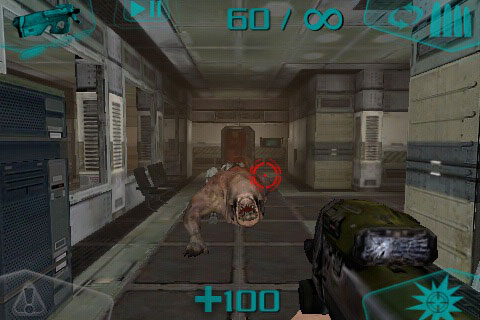Doom Resurrection – Additional Comments
November 27th, 2010
A follow-up to my previous article on mechanics.
Tracking
When enemies enter the screen space, the viewpoint tracks and follows them, giving the player the most advantageous angle to shoot them. At times, when a second cluster of enemies enters shortly after another, the player’s view will shift from the first cluster (which they’re probably still shooting at) to the incoming cluster throwing off their aim. There is a prime example of this in the Abaddon stage shortly after entering the second atrium.
Interplay
On-rails shooters, even more so than FPS games, lack interplay at a fundamental level and Doom Resurrection is a core example of this issue. Other games in the genre have combo systems, draw-back damage, destructible parts of the environment (which lead to branching routes), strategic dismemberment and other devices that create more back-and-forth interaction. Doom Resurrection is completely void of such amenities, leaving a very stripped down experience. The player engages with the game by shooting bullets into sponges and that’s all. So despite the portable-friendly nature of the game, even in short bursts of play the shooting tires very quickly.
Enemies are a pretty typical mix of walk-to-the-screen-and-slap-you types and stand-back-and-throw-shit-at-you types. Bosses are simply larger versions bogged down in dead space (ie. where the player does nothing) as the player points and unloads their clip, doing nothing for a few seconds.
Variation
The wonderful thing about the first level of Doom Resurrection is that by the time you’ve got to the end, you’ve basically seen all the game has to offer, besides some change in décor, different combinations of the same run-of-the-mill monsters and an unsurprising loadout of weapons. Each of the 8 levels are simply different arrangements of the same core, uninteresting elements.




 Game Design Companion: A Critical Analysis of Wario Land 4 - $7.99
Game Design Companion: A Critical Analysis of Wario Land 4 - $7.99 Level Design: Processes and Experiences
Level Design: Processes and Experiences Speed Boost: The Hidden Secrets Behind Arcade Racing Design - $5.99
Speed Boost: The Hidden Secrets Behind Arcade Racing Design - $5.99 Adventures in Games Analysis: Volume I - $5.99
Adventures in Games Analysis: Volume I - $5.99







